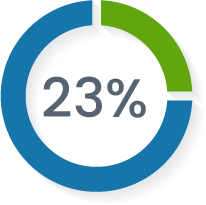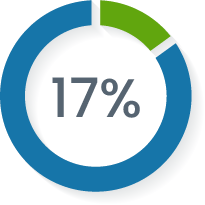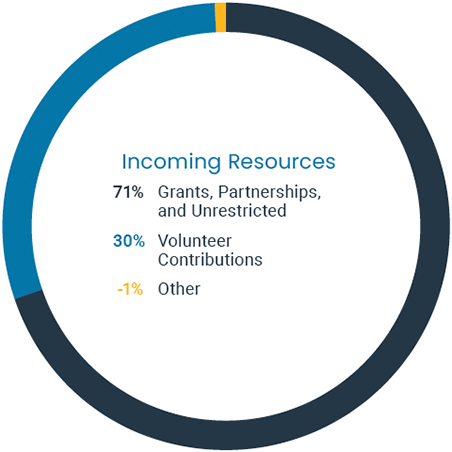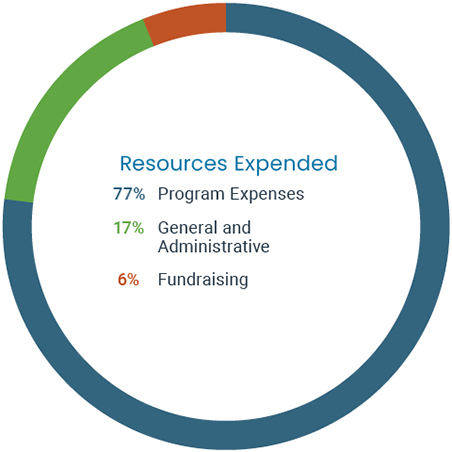Our Funding Model
Volunteer Contributions
Expedition costs vary greatly depending on the type of research, length, location, and size of each research team, but on average, here is how Earthwatch allocates volunteer contributions:

50% is sent as a grant to the scientist leading the expedition to pay for volunteer meals and accommodations, supplies, equipment, research permits, staff, rent and utilities, and transportation.

23% is spent on safety and welfare measures. It is critical to conduct thorough political, meteorological, and physical risk assessments well before the first volunteer steps foot onto a research site. Similarly, Earthwatch vets all scientists and staff to ensure that they are fully trained in Earthwatch safety protocols and emergency evacuation procedures. Earthwatch maintains a 24/7 emergency hotline for its scientists and volunteers, and every volunteer contribution includes emergency medical and evacuation insurance and global emergency assistance for each participant.

17% is spent on preparing volunteers for their expedition. This includes helping volunteers choose and sign up for an expedition, screening each volunteer’s forms, preparing and providing expedition briefings before participants head into the field, answering all volunteer questions ranging from travel itineraries to dietary needs, and working to ensure that all Earthwatchers are thoroughly prepared for their expedition experience.

10% is spent on promoting each expedition, recruiting volunteers, and publishing key results and findings. The more volunteers who join a project, the more successful all aspects of that project will be, from the team dynamic, to the amount of data collected. Widely sharing outcomes not only inspires more participants to join and support the research, but they are often used by other scientists tackling similar ecosystem threats elsewhere in the world to advance their own studies.
.
Additional Sources of Revenue
Grants, Partnerships, and Unrestricted Donations
You may be surprised to learn that volunteer contributions do not fully sustain our expeditions. Instead, they cover between 80-90% of expedition costs and collectively makeup just half of Earthwatch’s total annual revenue. This is because Earthwatch purposely “undercharges” for its expedition experiences, in order to keep them affordable for as wide-ranging an audience as possible. It is also our way of recognizing our volunteers’ significant donations of time, labor, and spirit to every expedition!
Sometimes, the research itself limits the number of volunteers who can participate each year, placing additional funding pressures on that expedition. For example, a project with a very short research window based around the focal species' migration or a project in an extremely sensitive ecosystem that caps the total number of volunteers who can travel there each year will have fewer volunteers and, therefore, a greater percentage of its research funding that will need to be fundraised from the public through our Annual Fund. On average, Earthwatch relies on these donations to pay for 10-20% of each expedition’s expenses.
Earthwatch constantly walks a very fine line in order to remain inclusive while not undermining the quality of research or daily life in the field for existing projects. New research projects bring many challenges of their own—and Earthwatch often introduces several new projects per year. Preparatory work for a new expedition begins at least two years prior to when the first team of volunteers arrives at the rendezvous location and includes a thorough vetting of the research proposal by multiple experts in that field, interviewing potential scientists and field staff, pre-volunteer safety inspections, and much more. These efforts can cost anywhere between $45,000 and $90,000 to get each new expedition off the ground. Earthwatch actively raises money to cover these start-up costs so that they are not passed on to our volunteers once the research begins.
Additionally, Earthwatch grants over $500,000 per year in fellowships through a highly competitive, need-based application process to students and teachers who would not otherwise have the ability to participate on an Earthwatch expedition. For most student fellows, their Earthwatch expedition is their first time traveling any significant distance from home and their first time traveling without family. For many teacher fellows, their Earthwatch expedition is the first time they have received hands-on training in science education in many years, if ever at all.
Make a gift to support the research
Earthwatch is grateful to receive donations from a variety of sources. On average, here is that allocation:
41%: Foundations/Grants
37%: Corporate Partners
12%: Major Gifts & Bequests
10%: Annual Fund (Rosborough Society, Members, Donors)
Other
In a typical year, Earthwatch raises about 1% of its revenue from investment income.
Financial Summary for FY2022


.
Give with Confidence
Earthwatch is recognized by Charity Navigator, GuideStar, and the Better Business Bureau Wise Giving Alliance as an accredited and worthwhile charitable organization.
Earthwatch will not sell, rent, or exchange your personal contact information under any circumstances.
.
.